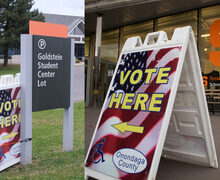Alex Epstein opposes net-zero carbon emissions policies in lecture hosted by College Republicans
Isabella Flores | Asst. Photo Editor
Alex Epstein, advocator for fossil fuels, held a lecture and Q&A session at Syracuse University's Schine Student Center. Epstein took a stance against the "net-zero" carbon emissions policies at the event.
Get the latest Syracuse news delivered right to your inbox.
Subscribe to our newsletter here.
Around 50 people gathered in Schine Student Center’s Goldstein Auditorium Wednesday night for a carbon emissions policy lecture and Q&A session with Alex Epstein, a speaker for the conservative group Young America’s Foundation. SU College Republicans hosted the event.
Epstein has advocated against “net-zero” carbon emissions policies and for the use of fossil fuels. The event was also live-streamed and now has over 3,000 views on the YAF’s YouTube channel.
The lecture, titled “The Case Against Zero,” was originally set to be a debate between Epstein and Tom Rand, a self-identified climate capitalist and author of “The Case For Climate Capitalism.” The event changed when Rand was unable to attend the debate due to “bureaucratic reasons,” John Parker, president of the College Republicans at SU, told The Daily Orange Wednesday afternoon.
Epstein, author of “The Moral Case for Fossil Fuels” and “Fossil Future,” is known for being a fossil fuel advocate and for publishing racist and colonial statements during his time at Duke University.
In the lecture, Epstein’s main argument was against carbon emission policies that aim to be net zero by 2050. He said net zero policies have been and will continue to be “catastrophically destructive” if they are continued to be implemented.
Instead, Epstein advocated for what he calls “energy freedom policies,” which support the freedom for all forms of energy to be produced and consumed, including nuclear energy and fossil fuels.
“I’m also very enthusiastic about people being free to use fossil fuels. For the foreseeable future, I believe that’s the only way that billions of people can get the energy they need to have really good lives,” Epstein said.
Cost-effectiveness was another factor Epstein pointed to as important for generating energy on a scale of “billions of people in thousands of places,” refuting claims that solar and wind are cheaper forms of energy.
“Fossil fuels are uniquely cost-effective,” Epstein said. “Cost-effective energy is essential to our ability to survive and flourish on this planet.”
In an effort to make up for the initial debate being canceled, Epstein organized his lecture into addressing every “plausible” counterargument against his energy freedom policies and support of fossil fuels. In order to formulate potential opposing views, he said he had researched opposing views, specifically Rand’s.
One of the opposing views Epstein addressed in his lecture was that the world is more endangered than ever by climate because of fossil fuels’ carbon dioxide emissions, which he called a “myth.”
To rebut this argument, he claimed that climate-related disaster deaths were down due to “enormous fossil fueled climate mastery abilities,” citing data that showed a 98% decline between the 1920s and today. Reuters recently found this data to be “misleading,” saying disaster mortality is not a useful metric for quantifying climate change.
“If we have energy freedom to use fossil fuels and other forms of energy we are going to get ever better at mastering climate danger,” Epstein said. ”Whereas with net zero, climate danger will drastically increase.”
Epstein also said many scientists and media organizations who claim fossil fuels will contribute to a future climate disaster are often “distorting climate science for effect.”
“I definitely listen to experts if they are actual experts, but I need to listen to their reasons because often people who say they’re experts are actually distorting the facts,” Epstein said.
The lecture portion of the event lasted approximately an hour and 10 minutes, whereas the Q&A session lasted under a half hour, allowing for just four audience members’ questions.
“None of us are professionals in climate science who have done this before, and so having us hold him accountable and only have four questions to do that, it’s just kind of ridiculous and he kind of got to say everything without any pushback at all,” Spencer Berg, a student at SUNY ESF said.
In attendance at the event was a variety of local students, faculty and members of the YAF, many of whom said they came wanting to see a debate.
“I was here for a debate to get a more precise and detailed explanation of what the two parties are seeing, instead of just one guy presenting,” said Piyush Mishra, a computer science graduate student at SU.
Grayden Mitchell, a freshman studying political science in SU’s Maxwell School of Citizenship and Public Affairs, said he thought Epstein still addressed some of Rand’s points despite his absence. Mitchell, a member of YAF, said he views the energy industry as crucial during a time of climate uncertainty.
“It’s really important to have a clear and concise plan rather than just to say, we need to go all in on renewables as quickly as possible,” Mitchell said. “What we need to do is actually find realistic, cost-effective solutions that can work rather than just going along and bulldozing along some idealistic path that’s not rooted in reality.”
Published on September 21, 2023 at 12:51 am
Contact Samantha: saolande@syr.edu






